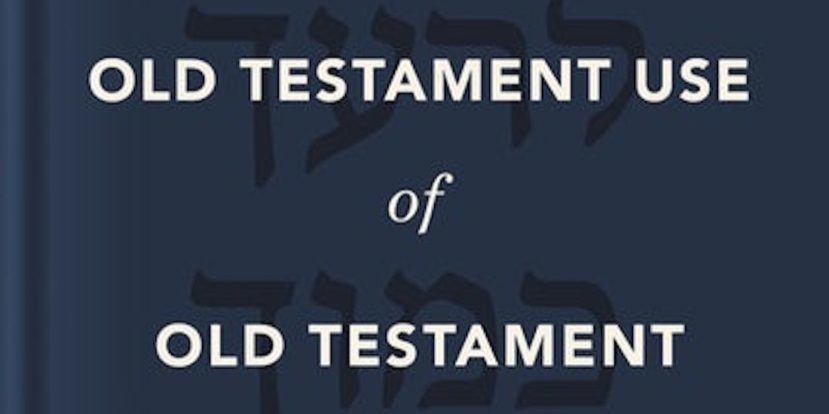
Surprises of Old Testament Use of Old Testament: Part 3
This post continues the series with the next surprise that came out of researching and writing a reference work on the use of scripture within Israel’s scriptures entitled Old Testament Use of Old Testament.[i] (See parts one and two.)
Unexpected Observation Three: The Prophets’ Use of Torah
Moses told his constituents to expect a prophet like himself. This expectation includes within it a couple of tests for the messages delivered by prophets. The constituents of prophets need to measure their messages against reality and against Torah. If what a prophet says does not come to pass, this person is a false prophet.[ii] And, if a prophet promotes a teaching contrary to Torah, this person needs to be put to death as a false prophet.[iii] In these ways Yahweh’s prophets are conservative. They only speak in accord with the reality that Yahweh brings to pass by his sovereignty, and they only teach in accord with what he has revealed in his word.
The strong connection between Torah and prophets undergirds and informs every part of my seminary courses on the prophets. Teachers like me never tire of helping students connect prophetic messages with covenant and Torah. But it never occurred to me that the prophets nowhere bother to offer extended, detailed explanation of Torah. Only when I had put together the chapters on the prophets for a reference work on scriptural exegesis in Israel’s scriptures did I realize what is not in the prophets.
How do the prophets of Israel and Judah use Torah? Only a tiny sample can be offered here.
The prophets, in general, expect their constituents to know Torah. They do not bother to teach or explain the intricacies of Torah, but they allude to them casually or tangentially. Hosea and Amos are the earliest writing prophets. While Hosea already can refer to written Torah,[iv] he tends to make fleeting allusions frequently in the form of similes to attack his wayward constituents. He refers to the lesser known cities of the plain that Yahweh destroyed along with Sodom and Gomorrah. Notice the way Hosea uses “overturn” (emphasis refers to verbal parallels in Hebrew).
The whole land [of Israel] will be a burning waste of salt and sulfur—nothing planted, nothing sprouting, no vegetation growing on it. It will be like the destruction of Sodom and Gomorrah, Admah and Zeboyim, which Yahweh overthrew [הפך] in fierce anger (Deut 29:23 NIV).
How can I give you up, Ephraim? How can I hand you over, Israel? How can I treat you like Admah? How can I make you like Zeboyim? My heart is overturned [הפך] within me; all my compassion is aroused (Hos 11:8 lit.).
Amos weaponizes Torah. He takes for granted that his constituents know Torah and obey it selectively. If Torah speaks of bringing tithes once every three years, Amos mocks the bogus religious zeal of his auditors who, he says, bring tithes every three days.[v] Amos scorns the affluent shrine-goers who abuse the poor and then seek to worship the God of Israel.
Isaiah takes advantage of the two kinds of others in Torah. The subtlety of his poetic allusions presuppose that his constituents know Torah well, at least intellectually. In Exodus, uncircumcised others are excluded and circumcised others are included in Passover.[vi] In Deuteronomy 23, Egyptians and Edomites represent included others who may assimilate in three generations while Ammonites and Moabites represent excluded others forever banned from the assembly of Yahweh.[vii] Isaiah exegetically alludes to the law of the assembly in Deuteronomy 23 by looking ahead to a day when uncircumcised excluded others shall never again violate Lady Jerusalem.[viii] Isaiah also exegetically alludes to the law of the assembly by assuring those who count themselves as excluded that others who bind themselves to Yahweh’s covenant shall enjoy a standing better than sons and daughters within his house of prayer.[ix] The prophets accept that knowledge of Torah is not the problem. Israel’s problem lies much deeper—revolution against Yahweh. Click To Tweet
Ezekiel creates a dark parody by bringing together two different legal contexts to shame his constituents. Ezekiel re-works the law of individual responsibility in court cases with the threat of cannibalistic desperation during siege warfare where women are depicted eating their own children (bold and italics signify verbal parallels in Hebrew, and underlining signifies parallel Hebrew verb forms).[x]
You will eat the flesh of your sons and the flesh of your daughters (Lev 26:29 NIV).
Parents are not to be put to death for their children, nor children put to death for their parents; each will die for their own sin (Deut 24:16 NIV).
Therefore in your midst parents will eat their children, and children will eat their parents (Ezek 5:10a NIV).
Ezekiel excels at horrific parodies of judgment, using scriptural exegesis against the elite class of exiles that long to return to their lives of privilege in their homeland.
Calling for Repentance
This small fraction of examples of scriptural exegesis from the prophets makes the point. The prophets rarely, if ever, need to explain the details of Torah to their constituents. Instead, their abundant exegesis of scriptural traditions tends to use irony, sarcasm, and subtle figures of speech in futile attempts to get rebellious Israel and Judah to repent.
What surprised me then is not that the prophets pummeled their constituents with Torah. Probably everyone knows that. I am surprised that the prophets do not think any of the problems stem from lack of knowledge. For the prophets, Torah makes sense and they expect their constituents to know it well.
If today’s ministers of the word bemoan the “biblical illiteracy” of modern congregants, they look at their role somewhat differently than the prophets of Israel’s scriptures. Biblical ignorance is one problem and, judging by the exegesis of scripture within the Hebrew prophets, disobedience is another. Put in this light, ministers of the word today often serve congregants who need to learn Yahweh’s will along with turning away from disobedience.
In sum, the prophets’ use of scripture is both predictable and surprising. As preachers of the covenant, the prophets excel at using Torah as a weapon against their hapless constituents. The point is never to hurt Israel, but to call them to repentance. In spite of the heavy-handed use of scriptural traditions, the prophets surprise by nowhere pausing to explain Torah. The prophets accept that knowledge of Torah is not the problem. Israel’s problem lies much deeper—revolution against Yahweh.
Footnotes
[i] See Gary Edward Schnittjer, Old Testament Use of Old Testament (Grand Rapids: Zondervan Academic, at press).
[ii] See Deut 18:22.
[iii] See Deut 13:1–5.
[iv] See Hos 8:12.
[v] See Amos 4:4; cf. Deut 14:28; 26:12.
[vi] See Exod 12:43–49.
[vii] See Deut 23:3–8.
[viii] See Isa 52:1; cf. Lam 1:10.
[ix] See Isa 56:1–7.
[x] See Moshe Greenberg, Ezekiel 1–20 (Garden City, NY: Doubleday, 1983), 113–14.

